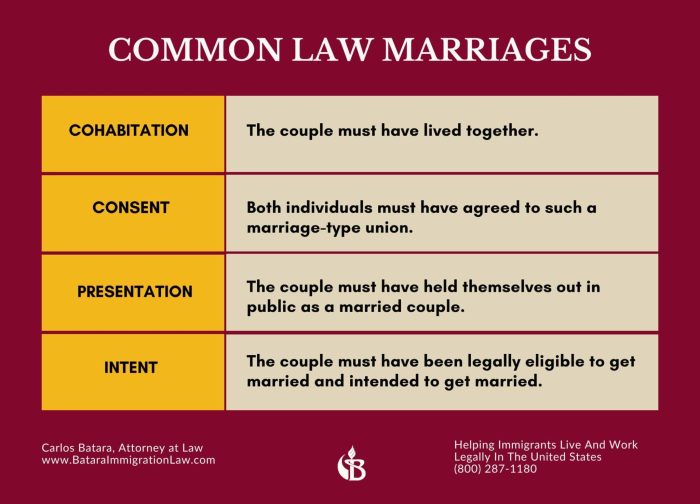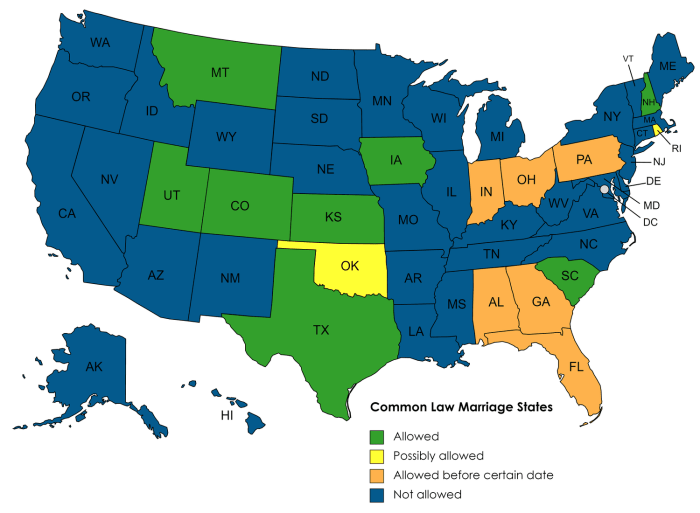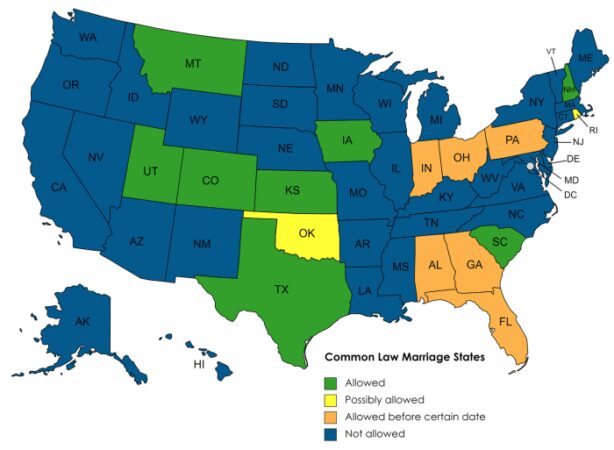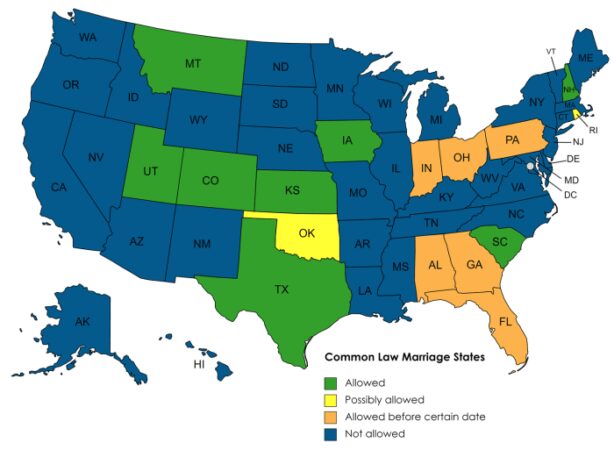
Does California have common law marriage? This question often arises, especially for couples who have been together for an extended period without a formal marriage ceremony. While many states recognize common law marriage, California is not one of them. This means that even if a couple lives together, presents themselves as married, and holds themselves out to the public as husband and wife, they will not be legally recognized as a common law marriage in California. Understanding California’s stance on common law marriage is crucial for couples who are considering their legal and financial implications.
This article delves into the reasons behind California’s unique position, explores the legal consequences of claiming common law marriage in the state, and provides alternative options for couples seeking legal recognition. We will also examine the requirements for common law marriage in other states and discuss the potential legal implications of common law marriage.
What is Common Law Marriage?

Common law marriage, also known as informal marriage or unregistered marriage, is a legal relationship recognized in some jurisdictions where a couple who have not formally married are considered legally married if they meet certain criteria. This concept has historical roots and varies in recognition across different states and countries.
Legal Recognition of Common Law Marriage in the United States
Common law marriage is a legal concept that has been recognized in the United States for centuries, stemming from English common law. It allows couples to establish a legally binding marriage without going through a formal ceremony or obtaining a marriage license. However, the recognition of common law marriage varies significantly across states.
States That Recognize Common Law Marriage
The following states currently recognize common law marriage:
- Colorado
- Iowa
- Kansas
- Montana
- New Hampshire (for inheritance purposes only)
- Oklahoma
- Rhode Island
- South Carolina
- Texas
- Utah
- District of Columbia
It is important to note that even in states that recognize common law marriage, there are specific requirements that must be met to establish a valid common law marriage. These requirements typically include:
- Presentation to the public as married: The couple must present themselves to the public as being married, such as using the same last name, referring to each other as husband and wife, and filing joint tax returns.
- Intent to be married: The couple must have the intention of being married, and this intent must be present at the time they begin living together as a married couple.
- Cohabitation: The couple must live together as husband and wife. The duration of cohabitation required to establish a common law marriage varies by state, but it is typically a minimum of one year.
California’s Position on Common Law Marriage

California does not recognize common law marriage. This means that a couple cannot become legally married simply by presenting themselves as husband and wife or by living together for a certain period of time.
Legal Explanation for California’s Position
California’s stance on common law marriage is rooted in its statutory requirements for marriage. The state requires a valid marriage license and a formal ceremony performed by an authorized officiant. This requirement is codified in the California Family Code, which explicitly states that common law marriages are not recognized.
Legal Consequences of Claiming Common Law Marriage in California
A couple claiming common law marriage in California will not be legally recognized as married. This means that they will not have the same rights and obligations as legally married couples, such as:
* Inheritance rights: If one partner dies, the surviving partner may not inherit any property.
* Spousal benefits: The surviving partner may not be eligible for spousal benefits such as Social Security or pension benefits.
* Child custody and support: In the event of a separation, the couple will not be subject to the legal framework for child custody and support that applies to married couples.
* Tax benefits: Couples claiming common law marriage will not be eligible for tax benefits such as filing jointly.
It is important to note that even if a couple has been living together for many years and has held themselves out as married, they will not be considered legally married in California.
Requirements for Common Law Marriage in Other States
While California does not recognize common law marriage, several other states do. Understanding the requirements for establishing a common law marriage in these states is crucial for individuals who may be considering or currently residing in a state that recognizes this legal arrangement.
Requirements for Common Law Marriage in Other States, Does california have common law marriage
The requirements for establishing a common law marriage vary significantly from state to state. Here is a table outlining the specific requirements in states that recognize common law marriage:
| State | Requirements | Duration | Legal Recognition |
|---|---|---|---|
| Colorado | Present themselves as married, intend to be married, and hold themselves out to the public as married | None specified | Recognized |
| Iowa | Represent themselves as married, intend to be married, and live together as husband and wife | None specified | Recognized |
| Kansas | Represent themselves as married, intend to be married, and live together as husband and wife | None specified | Recognized |
| Montana | Represent themselves as married, intend to be married, and live together as husband and wife | None specified | Recognized |
| New Hampshire | Represent themselves as married, intend to be married, and live together as husband and wife | None specified | Recognized |
| Oklahoma | Represent themselves as married, intend to be married, and live together as husband and wife | None specified | Recognized |
| Rhode Island | Represent themselves as married, intend to be married, and live together as husband and wife | None specified | Recognized |
| South Carolina | Represent themselves as married, intend to be married, and live together as husband and wife | None specified | Recognized |
| Texas | Represent themselves as married, intend to be married, and live together as husband and wife | None specified | Recognized |
| Utah | Represent themselves as married, intend to be married, and live together as husband and wife | None specified | Recognized |
| District of Columbia | Represent themselves as married, intend to be married, and live together as husband and wife | None specified | Recognized |
Legal Implications of Common Law Marriage: Does California Have Common Law Marriage
Common law marriage, despite not being recognized in California, carries significant legal implications in states where it is valid. Understanding these implications is crucial, especially for individuals who may have entered into a common law marriage in another state and are now residing in California.
Rights and Obligations
The legal rights and obligations associated with common law marriage are similar to those of traditional marriages. This includes:
- Financial Support: Common law spouses can seek financial support from each other in cases of separation or divorce. This can involve alimony, child support, and division of marital assets.
- Inheritance Rights: Common law spouses often inherit from each other in the absence of a will. This is based on the legal principle of intestacy, where the state Artikels inheritance rules when a person dies without a will.
- Health Care Decisions: Common law spouses have the right to make medical decisions for each other in the event of incapacitation.
- Spousal Privileges: Common law spouses can invoke spousal privileges in legal proceedings, such as refusing to testify against their spouse.
Property Division
In common law marriage situations, property division can be a complex issue.
- Community Property: States with common law marriage typically treat property acquired during the marriage as community property. This means that the assets are equally owned by both spouses, and upon separation or divorce, they are divided equally.
- Separate Property: Property owned before the common law marriage or received as a gift or inheritance during the marriage is considered separate property. It is generally not subject to division during separation or divorce.
- Tracing: In some cases, it may be necessary to trace the source of assets to determine if they are community or separate property. This can involve examining financial records, deeds, and other documentation.
Legal Disputes
Common law marriage situations can give rise to various legal disputes.
- Validity of the Marriage: Disputes can arise over the validity of the common law marriage, particularly if one party denies its existence. Courts will often examine evidence such as public declarations of marriage, cohabitation, and financial intermingling to determine validity.
- Property Division: Disagreements over the division of property are common, especially when parties have significant assets or complex financial arrangements. This can involve disputes over the valuation of assets and the classification of property as community or separate.
- Child Custody and Support: If children are involved, disputes over custody, visitation, and child support can arise. These disputes may involve determining the legal parent of the children and the appropriate level of financial support.
- Domestic Violence: Like traditional marriages, common law marriages can be subject to domestic violence issues. Seeking legal protection and obtaining restraining orders can be crucial in these situations.
Alternative Options for Couples in California

California does not recognize common law marriage, so couples seeking legal recognition of their relationship must consider other options. These alternatives offer various benefits and limitations, providing couples with choices tailored to their specific needs and circumstances.
Domestic Partnerships
Domestic partnerships offer legal recognition for same-sex and opposite-sex couples in California. They provide many of the same rights and responsibilities as marriage, including inheritance rights, hospital visitation, and decision-making in medical emergencies.
Domestic partnerships are registered with the California Secretary of State and provide legal recognition to couples who are not married.
Benefits of Domestic Partnerships
- Provides legal recognition and rights similar to marriage.
- Offers inheritance rights, hospital visitation, and decision-making authority in medical emergencies.
- Available to both same-sex and opposite-sex couples.
Limitations of Domestic Partnerships
- Do not provide the same federal tax benefits as marriage.
- May not be recognized in all states.
Cohabitation Agreements
Cohabitation agreements are legally binding contracts that Artikel the financial and legal arrangements between unmarried couples living together. These agreements can address issues such as property ownership, financial contributions, and responsibilities in case of separation.
Cohabitation agreements are written contracts that establish the legal and financial terms of a relationship between unmarried couples living together.
Benefits of Cohabitation Agreements
- Provides legal clarity and protection for both parties regarding finances and property.
- Offers flexibility to tailor the agreement to the specific needs of the couple.
- Can help prevent disputes and legal complications in case of separation.
Limitations of Cohabitation Agreements
- Requires legal counsel to ensure the agreement is valid and enforceable.
- May not cover all aspects of a relationship, such as child custody or support.
Comparison with Common Law Marriage
Unlike common law marriage, domestic partnerships and cohabitation agreements provide legal recognition and protection for couples in California. Domestic partnerships offer similar rights to marriage, while cohabitation agreements provide customized legal arrangements. Both options require formal steps to establish legal recognition, unlike common law marriage, which relies on public representation and intent.
Final Summary
In conclusion, while common law marriage is recognized in many states, California does not acknowledge it. This means that couples in California seeking legal recognition of their relationship must formalize their union through a traditional marriage ceremony. Understanding California’s stance on common law marriage is crucial for couples considering their legal and financial implications. Seeking legal advice is always recommended to ensure proper understanding of the law and to protect your rights and interests.
Query Resolution
What are the benefits of a formal marriage in California?
Formal marriage in California offers numerous benefits, including legal recognition of the relationship, inheritance rights, spousal support, and tax benefits.
Can I claim common law marriage in another state if I move there?
If you move to a state that recognizes common law marriage and meet the requirements, you may be able to establish common law marriage in that state.
What are some alternative legal options for couples in California?
Alternatives include domestic partnerships, cohabitation agreements, and prenuptial agreements, each offering different levels of legal recognition and protection.
What are the potential legal challenges associated with claiming common law marriage in California?
Potential challenges include proving the intent to be married, establishing the elements of a common law marriage, and facing legal disputes over property division and inheritance.


